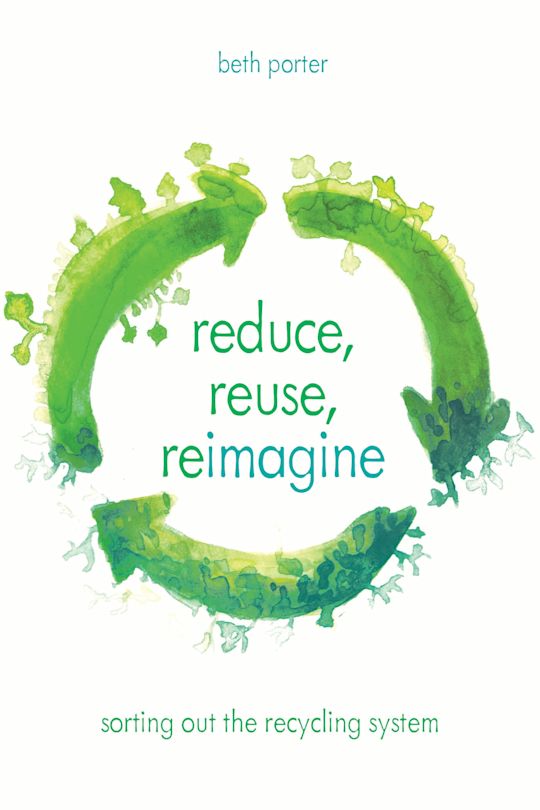- Home
- NON-FICTION
- Health & Lifestyle
- General Lifestyle
- Reduce, Reuse, Reimagine
- Delivery and returns info
-
Free US delivery on orders $35 or over
You must sign in to add this item to your wishlist. Please sign in or create an account
Description
Ecosystems require balance to survive, and when that balance is compromised, disaster can befall the whole system. To keep a balance in our global ecosystem, we need to use resources efficiently, equitably, and sustainably. In both nature and economics, we observe that when a healthy distribution of resources is achieved, systems can not only function but flourish.
The United States recycles roughly 34% of its waste and has been stuck at this level for decades. Recycling brings a balance to our system by managing resources in a loop. When done well, it benefits communities and the environment. Individuals are a key part of connecting this loop because we provide a supply of materials and a demand for new recycled products. But many of us don’t know what happens after those items leave our homes. We’re confused by inconsistent rules of what we can and can’t recycle. Our confusion has huge consequences and is a reason why our recycling is stuck. Throughout Reduce, Reuse, Reimagine, Beth Porter provides answers to clear up that confusion, and shares great resources about recycling, explaining the complexity, guiding individual action, and contextualizing its history. This book reveals how we arrived at this state of dysfunction, and what steps we need to employ to be an active participant in strengthening our recycling system. Nature knows how to recycle itself, decomposing waste back into the soil to continue the circle of growth. We should follow its lead.
Table of Contents
, The Ecosystem of Recycling
,
Chapter 2
, When Recycling Was Patriotic
,
Chapter 3
, Running Out of Room
,
Chapter 4
, Why Reduce and Reuse Come First
,
Chapter 5
, What’s the Point of Recycling?
,
Chapter 6
, Where Your Recyclables Go
,
Chapter 7
, How Psychology Affects Recycling
,
Chapter 8
, Economics of Recycling
,
Chapter 9
, Taking Action from Your Curbside to Capitol Hill
,
Product details
| Published | Nov 15 2018 |
|---|---|
| Format | Hardback |
| Edition | 1st |
| Extent | 232 |
| ISBN | 9781538105399 |
| Imprint | Rowman & Littlefield |
| Illustrations | 2 b/w photos |
| Dimensions | 9 x 6 inches |
| Publisher | Bloomsbury Publishing |
About the contributors
Reviews
-
Reduce, Reuse, Reimagine offers the reader a concrete social and scientific framework for exploring the recycling system for materials that are integral to solutions to the larger issues of environmental sustainability and economic development in our consumer-based society. Failing to recognize the importance of mitigating consumption leaves us awash in oceans of garbage of our own making. Porter, a first-time author and nonprofit climate program director, offers a responsible point of view in nine easy pieces ranging from recycling’s patriotic beginnings in WW II to the psychology of consumption and its economic drivers emerging today from the remnants of the throw-away society that was its legacy. Between the covers of this important and timely book, readers will find useful and often interesting tips, as well as chapter notes, citations, and a working index. It may be about trash, but trash it is not: it is rather a vitally useful work that reminds readers of the need for effective waste management and recycling practices in this age of global climate change. Recommended.
Choice Reviews
-
Porter, climate and recycling director for the nonprofit Green America, offers a succinct treatise on the history, efficacy, and future of recycling and waste disposal in her informative debut. She begins with the history of recycling as a patriotic act during WWII and includes delightful details about the ubiquity of victory gardens and the social pressure exerted by scrap drives. Revelations about the aggressive marketing done by manufacturers to convince Americans that waste is their personal failing (and not one that industry holds responsibility for) sit alongside direct, actionable advice on lessening one’s environmental impact. Porter also discusses what she terms environmental racism; for example, the seizure of indigenous lands for production and harvesting, and the overwhelming placement of landfills and incinerators in black or Hispanic communities. Porter also delves into the individual recycling rates of specific materials such as plastic (less than 10% globally) vs. steel (92% in the U.S.), stresses the importance of buying recycled materials, and concludes with a list of concrete steps for being a better environmental steward. Porter’s prose is direct and backed with overwhelming data, as well as examples of functional recycling models in various cities and countries worldwide. This heartfelt plea from a dedicated environmentalist is a clear guide to responsible waste management.
Publishers Weekly
-
We’ve all heard that recycling isn’t working anymore in the U.S., but we’re not hearing how we can fix it. Beth Porter takes us beyond the act of recycling itself to an understanding of the ways in which we use and waste materials as a society, and maps out the solutions we can start implementing today in our communities and in our homes.
Todd Larsen, Executive Co-Director, Green America
-
Beth Porter presents an image of recycling as a tiny acorn that with nurturing can to grow into a viable system that greatly benefits the country financially and environmentally. She then presents a history and the practice of recycling in the US. At a time when China's recycling policies are roiling the recycling world, her book is important for both specialists and the public at large.
Neil Seldman, PhD, Director, Waste to Wealth, Institute for Local Self-Reliance, Washington, DC
-
Porter delivers a thoughtful rallying cry for one of the most basic and misunderstood environmental acts we can all take. This is a helpful primer for anyone interested in the future of recycling at a moment when many are wondering if the economics behind it can still work.
Cole Rosengren, Senior Reporter, Waste Dive


































